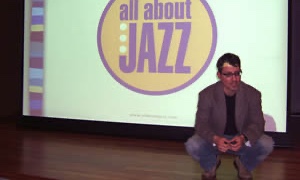Home » Jazz Articles » AAJ PRO » The Musical Art of Jazz: Your Own Thing
The Musical Art of Jazz: Your Own Thing
Are the material and artistic senses diametrically opposed? "Success" can be measured in a variety of ways: musical, monetary, security, prestige, etc. Much unhappiness is caused by the inability of individuals and organizations to accept the goals and priorities of others. Different goals reflect different personalities. These different personalities create much of what is unique and exciting in life and in the arts. Musical art welcomes unique personalities, not corporate styled manikins. Indeed, without these unique personalities, the art of jazz would be reduced to a science of reproduction rather than an art of creation.
The world accepts particular standards. The evidence of these standards lives as a testimonial which verifies the validity, potential success and security of a field. People are drawn toward the careers in medicine, in law, etc. not by dedication alone. Physical evidence of success plays a strong contributing part in the inclination of individuals toward the pursuit of any field. Why can't the art of music exhibit the same trappings and be as legitimate? The dedicated surgeon is a good example of an individual typified by hard work, dedication and the common good who is financially well compensated. Does the financial compensation signify a compromise on his part? Are the two dedications, medicine and music, essentially so different such that the comparison is invalid? Question: Would the surgeon be less dedicated, less moved by essential good intentions if he were poor? The surgeon's obvious position, stature, income, etc. must act as a positive incentive to draw people into the field—some perhaps with greater ability than the surgeon himself. Without the external trappings would this futuristic individual have entered the field at all? Potential can exist at any depth. It often lies unawakened, dormant. So why does musical art continue to shun the trappings of material success? Is it beyond it or is it afraid of it? And if so, why? What does it fear? What others will say? That it will somehow injure the authentic motivations that originally moved it toward its own chosen objective?
In a world of diminishing standards, the artist must struggle to develop his potential. Since a prime purpose of art is communication, it is understandable why the artist is so frequently unhappy. He feels that his message is falling on deaf ears. More often than not, he does not even find an audience or acceptance for his work. Being human, this situation is most difficult to accept. Hopefully, the artist does not accept it but continues to strive forward in order to develop and fulfill himself. The hope is that this growing fulfillment will draw others to the music. Virtually every artist wants acceptance though many profess the opposite. I think that this negative approach toward acceptance is used essentially as a protective defense for the artist. It is not difficult to accept non acceptance when you expect it.
Bill Evans said in an interview once that jazz is an art and that in the the long run, we must play what pleases us. His advice was to not chase trends or players or even audiences. Instead, the focus should be on developing our art and craft and then find the audience that likes what we like. Here's where today's internet comes into play. Through new techniques available to us now, we can find these audiences by exploring the world's population instead of limiting ourselves to a local population.
What is the solution to the problem of the "musical artist in the world?" There must be more artists demanding to be heard. In conjunction with this, there must be organizations with foresight, promotional ability, dedication, determination and sensitivity to influence many to influence still others spreading from underneath the public. In this way, the standards of the world would be elevated to the point that we would happily no longer recognize the current world against which the artist musician so desperately struggles.
Tags
About Saxophonist Chuck Anderson
Instrument: Saxophone
PREVIOUS / NEXT
Support All About Jazz
 All About Jazz has been a pillar of jazz since 1995, championing it as an art form and, more importantly, supporting the musicians who make it. Our enduring commitment has made "AAJ" one of the most culturally important websites of its kind, read by hundreds of thousands of fans, musicians and industry figures every month.
All About Jazz has been a pillar of jazz since 1995, championing it as an art form and, more importantly, supporting the musicians who make it. Our enduring commitment has made "AAJ" one of the most culturally important websites of its kind, read by hundreds of thousands of fans, musicians and industry figures every month.
























